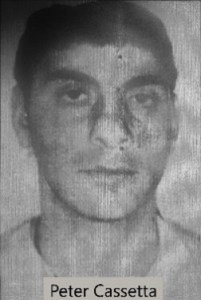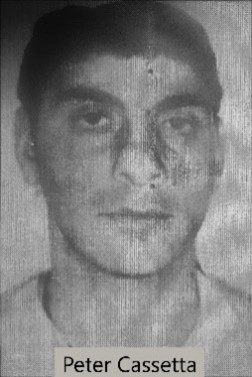April 12, 1965-
Peter Cassetta was a Somerville guy. We know that because he was one of those guys who like to stay around their home area to commit crimes. They feel more comfortable hanging around the town they know. Whitey Bulger was like Cassetta. All the murders Whitey probably committed were done in South Boston or within a mile or two south of it. Whitey even buried the bodies of his victims within that small geographic distance. South Boston was his comfort zone; outside it he simply did not show the bravado he demonstrated on his home court.
So it was with Peter Cassetta. One report has it that his first brush with the law came when he was only 17, as we have seen this with a lot of these criminals. Between the ages of 17 and 34, he was arrested in Somerville a total of 28 times. Yet, he never did any time. Most of the arrests were for the minor stuff such as booking, receiving stolen goods, operating under the influence of alcohol, and drunkenness when it was a crime.
 According to one report, he “had a nervous condition.” The report stated that the nervous condition was so bad that even though he was liked, he was never trusted. It noted he was only given low level jobs such as running a bet, doing a pickup of money, or driving for someone. Cassetta hardly seems the type of guy you would want to murder. Yet Cassetta was murdered in a car he had rented less than a week before his death.
According to one report, he “had a nervous condition.” The report stated that the nervous condition was so bad that even though he was liked, he was never trusted. It noted he was only given low level jobs such as running a bet, doing a pickup of money, or driving for someone. Cassetta hardly seems the type of guy you would want to murder. Yet Cassetta was murdered in a car he had rented less than a week before his death.
He was killed in a professional manner: two bullets in the back of the head and dumped out of the car on a dirt road in Maynard off Route 27. His car was found behind a supermarket in Everett.
Cassetta allegedly ran a bookmaking office. He was said to owe money to loan sharks. After he was murdered, the rumors were that he “welshed on” or “crossed-swords” with the Office, Jerry Angiulo’s headquarters. Did it become obvious to the Office that he could never make up for what he owed so that his only value then was as an example? I would suggest it had to be more than just an example, but Cassetta clearly knew he had crossed some people intent on revenge. He had been hiding out.
It was reported that ten hours before he was found murdered, he showed up at the Middlesex Superior Court. He had been subpoenaed to be there as a defense witness for Robert Joynt who was on trial for attempted breaking and entering and possession of burglar tools. Robert was the brother of George “Ox” Joynt, mentioned earlier.
It is hard to figure out what evidence Cassetta could testify to which would have helped defendant Joynt. The defense lawyer was Al Farese. He defended a lot of the mob figures. Farese was the law partner of John Fitzgerald who lost his leg when his car was blown up by Flemmi and Salemme. Farese was the lawyer Stathopoulos went to see immediately after the Deegan murder.
Whenever I had a case with Farese, he seemed always in a hurry. When he realized that we were not going to be able to come to an agreement on the disposition of the case outside of going to trial, always pressed for time, he would say: “all right. That’s it. Now I’m going to take the gloves off” hoping that would resolve the matter in his favor.
An Al Farese tactic would be to put Cassetta on the stand and accuse him of committing the crime that the defendant Joynt faced. He would do this to cast doubt in the jurors’ minds. Cassetta, from what we know about his background, would not stand up too well to Farese’s examination. Perhaps, though, Farese had other reasons.
Detectives who saw Cassetta in court described him as extremely nervous and upset. We should not be surprised at that. The idea Farese was going to grill him had to be really bothering him. Yet, what the detectives observed may have been beyond the his usual nervousness, Cassetta knew he had been flushed out of hiding..
While he was waiting to be called, it appeared there would be no time left in the day for his testimony. He was told to come back the next day. He left the courthouse. He went to the place he was staying which was at the apartment of a woman friend.
She told the police that around 6:00 p.m. he received a call. She said the caller identified himself as Bill. He asked Cassetta to meet with him right away around the corner at a café. He must have been a friend Cassetta trusted for he went as requested.
She never saw him again. A Maynard police officer then observed him off the side of the road at 8:45 p.m., less than three hours later.
One report on his death mentioned that a person described as a thug with “murder in his eyes” had been searching for him. Up until that time, Cassetta had avoided him. Yet there was someone who knew he was at his friend’s place and knew the telephone number of his woman friend.
On April 12, it did not get dark until around 8:00 p.m. It is quite bold to murder someone in daylight and then drive a body with two bullets in its head from Somerville to Maynard, a 35-to-40-minute drive. He could not have been at the side of the road too long before the Maynard police officer found him.
Putting the facts together show he was in trouble and hiding out. He had rented a car to keep his whereabouts hidden. It was odd that he was subpoenaed by a defendant. Was his forced court appearance earlier in the day a way to flush him out of his hideout and determine what car he was driving? How would Bill know the telephone number of the place where he was staying unless Cassetta had given it to him?
Cassetta may have been hiding out but he also may have let some others he foolishly trusted know where he was staying. Was he followed from the courthouse? He was clearly set up to be murdered by whoever it was who made the phone call.
The case had many questions that had to be answered. The subpoena holds the key. If we find out why he was subpoenaed and who knew about it, we would be well on our way to knowing who did the hit. It was a professional hit. It was done quickly and brazenly.
The Somerville police floated the rumor that he was murdered for welshing on a bet. They said he had done it before but then he eventually paid it. This time he could not pay.
Cassetta had to have put in a big bet or accepted too big a bet and could not pay it off. Along with the bet, he may have been cooperating with the police. The North End usually acts quickly in those situations and brings in the hit men.
State Police investigators suggested he might have been slain because he knew too much about recent gangland slayings. They mentioned the Teddy Deegan case. That would be doubtful because he was a low life Somerville guy who would not have any information about it.
No one paid much attention to his murder. He was a lifelong petty criminal that few cared about. His murder was never solved.



I’d say the fact that he may have tried to screw ‘the office’ and owed money was the most likely reason.
One of the local bookies I grew up with in East Boston,an Irish guy,got caught past posting and got two in the
head on his front door steps.
.